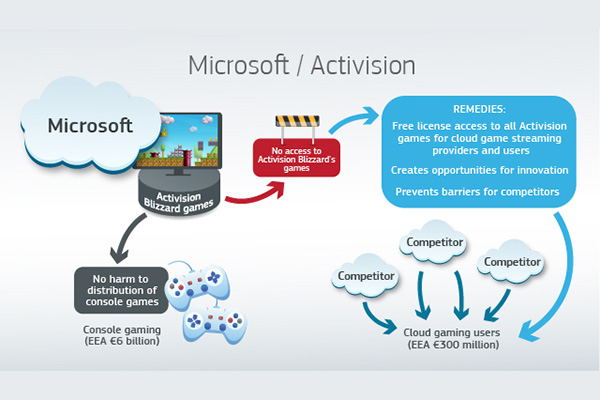EC clears Microsoft Activision acquisition
May 16, 2023
By Colin Mann

The European Commission has approved, under the EU Merger Regulation, the proposed $68.7 billion (€62.2bn) acquisition of Activision Blizzard by Microsoft. The approval is conditional on full compliance with the commitments offered by Microsoft, and comes some three weeks after the UK blocked the deal over concerns it would alter the future of the fast-growing cloud gaming market, leading to reduced innovation and less choice for UK gamers over the years to come.
According to the EC, the commitments fully address the competition concerns identified by the Commission and represent a significant improvement for cloud gaming as compared to the current situation.
The EC’s decision follows an in-depth investigation of the deal. The Commission says it has based its decision on hard evidence, and on extensive information and feedback from competitors and customers, including from game developers and distributors as well as cloud game streaming platforms in the EU.
Both companies develop and publish games for PCs, consoles, and mobile devices and distribute games for PCs. Microsoft also distributes games for consoles and offers the Xbox console along with a wide range of products and services, including the Windows PC operating system. Activision’s games portfolio includes famous franchises such as Call of Duty, World of Warcraft, Overwatch and Diablo.
The Commission’s preliminary investigation found that Microsoft could harm competition (i) in the distribution of console and PC video games, including multi-game subscription services and cloud game streaming services; and (ii) in the supply of PC operating systems.
The Commission’s in-depth market investigation indicated that Microsoft would not be able to harm rival consoles and rival multi-game subscription services. At the same time, it confirmed that Microsoft could harm competition in the distribution of games via cloud game streaming services and that its position in the market for PC operating systems would be strengthened.
In particular, the Commission found that:
- Microsoft would have no incentive to refuse to distribute Activision’s games to Sony, which is the leading distributor of console games worldwide, including in the European Economic Area (‘EEA’) where there are four Sony PlayStation consoles for every Microsoft Xbox console bought by gamers. Indeed, Microsoft would have strong incentives to continue distributing Activision’s games via a device as popular as Sony’s PlayStation.
- Even if Microsoft did decide to withdraw Activision’s games from the PlayStation, this would not significantly harm competition in the consoles market. Even if Call of Duty is largely played on console, it is less popular in the EEA than in other regions of the world, and is less popular in the EEA within its genre compared to other markets. Therefore, even without being able to offer this specific game, Sony could leverage its size, extensive games catalogue and market position to fend off any attempt to weaken its competitive position.
- Even without this transaction, Activision would not have made its games available for multi-game subscription services, as this would cannibalise sales of individual games. Therefore, the situation for third-party providers of multi-game subscription services would not change after the acquisition of Activision by Microsoft.
- The acquisition would harm competition in the distribution of PC and console games via cloud game streaming services, an innovative market segment that could transform the way many gamers play video games. Despite its potential, cloud game streaming is very limited today. The Commission found that the popularity of Activision’s games could promote its growth. Instead, if Microsoft made Activision’s games exclusive to its own cloud game streaming service, Game Pass Ultimate, and withheld them from rival cloud game streaming providers, it would reduce competition in the distribution of games via cloud game streaming.
- If Microsoft made Activision’s games exclusive to its own cloud game streaming service, Microsoft could also strengthen the position of Windows in the market for PC operating systems. This could be the case, should Microsoft hinder or degrade the streaming of Activision’s games on PCs using operating systems other than Windows.
The proposed remedies
To address the competition concerns identified by the Commission in the market for the distribution of PC and console games via cloud game streaming services, Microsoft offered the following comprehensive licensing commitments, with a 10-year duration:
- A free licence to consumers in the EEA that would allow them to stream, via any cloud game streaming services of their choice, all current and future Activision Blizzard PC and console games for which they have a license.
- A corresponding free licence to cloud game streaming service providers to allow EEA-based gamers to stream any Activision Blizzard’s PC and console games.
Currently, Activision Blizzard does not license its games to cloud game streaming services, nor does it stream the games itself. These licences will ensure that gamers that have purchased one or more Activision games on a PC or console store, or that have subscribed to a multi-game subscription service that includes Activision games, have the right to stream those games with any cloud game streaming service of their choice and play them on any device using any operating system. The remedies also ensure that Activision’s games available for streaming will have the same quality and content as games available for traditional download.
These commitments fully address the competition concerns identified by the Commission and represent a significant improvement for cloud game streaming compared to the current situation. They will empower millions of EEA consumers to stream Activision’s games using any cloud gaming services operating in the EEA, provided they are purchased in an online store or included in an active multi-game subscription in the EEA. In addition, the availability of Activision’s popular games for streaming via all cloud game streaming services will boost the development of this dynamic technology in the EEA. Ultimately, the commitments will unlock significant benefits for competition and consumers, by bringing Activision’s games to new platforms, including smaller EU players, and to more devices than before.
The Commission carefully investigated the effectiveness of the remedies, collecting views from a large number of market participants and stakeholders. In particular, cloud game streaming service providers gave positive feedback and showed interest in the licenses. Some of these providers have already entered into bilateral agreements with Microsoft based on the proposed licences to stream Activision’s games, once the transaction is completed.
Taking into consideration the feedback of the market, the Commission concluded that the proposed acquisition, as modified by the commitments, would no longer raise competition concerns and would ultimately unlock significant benefits for competition and consumers. The Commission’s decision is conditional upon full compliance with the commitments. Under supervision of the Commission, an independent trustee will be in charge of monitoring their implementation.
“Video games attract billions of users all over the world,” noted Margrethe Vestager, Executive Vice-President in charge of competition policy. “In such a fast-growing and dynamic industry, it is crucial to protect competition and innovation. Our decision represents an important step in this direction, by bringing Activision’s popular games to many more devices and consumers than before thanks to cloud game streaming. The commitments offered by Microsoft will enable for the first time the streaming of such games in any cloud game streaming services, enhancing competition and opportunities for growth.”
Following the EC announcement, the CMA said it stands by its decision. In a series of tweets, it said:
“The UK, US and European competition authorities are unanimous that this merger would harm competition in cloud gaming.”
“The CMA concluded that cloud gaming needs to continue as a free, competitive market to drive innovation and choice in this rapidly evolving sector.”
“Microsoft’s proposals, accepted by the European Commission today, would allow Microsoft to set the terms and conditions for this market for the next 10 years.”
“They would replace a free, open and competitive market with one subject to ongoing regulation of the games Microsoft sells, the platforms to which it sells them, and the conditions of sale.”
“This is one of the reasons the CMA’s independent panel group rejected Microsoft’s proposals and prevented this deal.”
“While we recognise and respect that the European Commission is entitled to take a different view, the CMA stands by its decision,” it confirmed.
Gareth Mills, Partner at law firm, Charles Russell Speechlys said: “The divergence of the EU Antitrust regulator’s approval for the Microsoft/ Activision acquisition from the decision of the CMA some three weeks ago may on the face of it seem surprising.”
However, it is worth noting that the EU’s approval is based on Microsoft agreeing to enter into licensing deals with rivals and with other behavioural remedies for future conduct providing regulatory safeguards. The picture is therefore more complex than a binary “approval/ rejection” of the respective regulators that supporters of the deal may seek to imply.”
The saga is unlikely to come to an end anytime soon with a legal complaint refiled last week in the Californian courts by gamers seeking an injunction, as well as Microsoft’s heralded appeal of the CMA’s decision and the US Federal Trade Commission’s case against the acquisition also still pending.”

